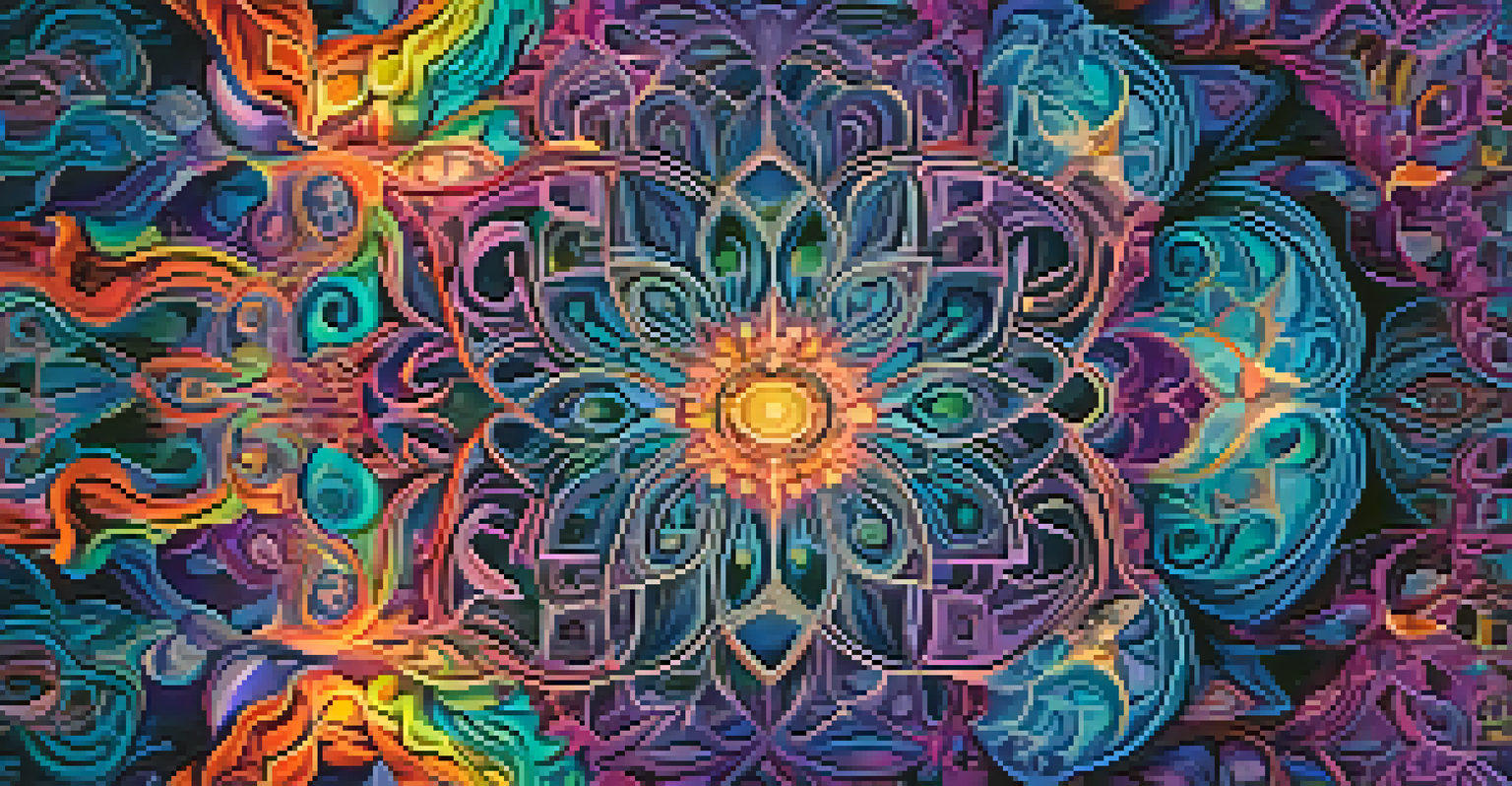DMT: Cross-Cultural Views on a Powerful Entheogen

What is DMT and Its Historical Significance?
DMT, or dimethyltryptamine, is a powerful psychedelic compound found in various plants and animals. Historically, it has been used in different cultures for spiritual and religious purposes, often referred to as an 'entheogen'—a substance that brings about a divine experience. Indigenous tribes in the Amazon, for example, have utilized DMT-rich brews like ayahuasca for centuries to facilitate healing and connection with the spiritual realm.
DMT is a powerful psychedelic that opens the door to a realm of consciousness that is often ignored in our daily lives.
The use of DMT in these contexts highlights its significance beyond mere recreation. It serves as a bridge to deeper understanding, community bonding, and personal transformation. By entering altered states of consciousness, users often report profound insights and a sense of interconnectedness with their surroundings.
As we delve into DMT's cross-cultural views, it’s essential to recognize that these experiences are not just personal journeys but are deeply intertwined with cultural practices and beliefs. This understanding creates a richer context for appreciating the diverse perspectives on this powerful entheogen.
Indigenous Uses of DMT: A Spiritual Connection
In many indigenous cultures, DMT is revered for its ability to facilitate spiritual experiences. For example, the Shipibo-Conibo people of the Peruvian Amazon utilize ayahuasca ceremonies to connect with their ancestors and the spirit world. These rituals often involve a shaman guiding participants through the experience, emphasizing the importance of community and shared understanding.

The ceremonies are not only about the individual but also about collective healing and wisdom. Participants often describe the DMT experience as a journey that reveals hidden truths and encourages introspection, allowing them to confront personal and societal issues. It’s a powerful reminder of how these practices can foster resilience and healing within communities.
DMT's Cultural Richness Explored
DMT serves as a bridge to spiritual experiences and healing in indigenous cultures, emphasizing community and personal transformation.
Moreover, these indigenous practices serve as a counter-narrative to the often commercialized and individualistic use of DMT in Western contexts. By exploring these spiritual connections, we can appreciate the depth and richness of the experiences that DMT offers across cultures.
DMT in Western Culture: A Shift in Perception
In Western societies, DMT has gained popularity primarily through underground cultures and the rise of interest in psychedelics for therapeutic use. This has led to a shift in perception, where DMT is increasingly seen as a tool for personal development and psychological healing rather than merely a recreational drug. Research into psychedelics has shown promising results in treating conditions such as PTSD and depression.
The experience of DMT is a deeply personal journey, yet it is intertwined with the cultural practices and beliefs of those who have used it for centuries.
However, this newfound interest also raises ethical questions about cultural appropriation. As Westerners adopt DMT practices without understanding their cultural significance, there’s a risk of commodifying sacred traditions. It’s crucial to approach these practices with respect and awareness, acknowledging their roots and the wisdom they carry.
This shift in perception also highlights the need for dialogue between cultures. By fostering understanding and respect, we can create a more inclusive approach to exploring DMT, ensuring that indigenous voices are heard and valued in the conversation.
DMT and the Science of Consciousness
The scientific community has shown a growing interest in DMT, particularly regarding its effects on consciousness. Researchers are investigating how DMT alters brain activity and why users report similar experiences, such as feelings of unity and transcendence. This exploration not only helps demystify the psychedelic experience but also opens doors to understanding human consciousness itself.
Studies using brain imaging techniques indicate that DMT may create a state of hyper-connectivity within the brain. This increased connectivity could explain the profound experiences reported by users, as different regions of the brain communicate in ways they typically do not. It’s a fascinating area of research that merges psychology, neuroscience, and spirituality.
Western Views on DMT Shift
In Western societies, DMT is increasingly viewed as a tool for psychological healing, raising ethical concerns about cultural appropriation.
While scientific insights are valuable, they should complement rather than replace the subjective experiences of DMT users. Understanding consciousness through both scientific and experiential lenses can lead to richer discussions about what it means to be human and how substances like DMT can influence our perceptions of reality.
DMT and Artistic Expression: A Catalyst for Creativity
DMT has often been linked to heightened creativity and artistic expression. Many artists, musicians, and writers have reported that their experiences with DMT have profoundly influenced their work. The intense visuals and altered states of consciousness can inspire new ideas, leading to innovative forms of expression that resonate deeply with audiences.
For instance, notable figures like Alex Grey, a visionary artist, have drawn upon their DMT experiences to create striking artworks that explore themes of spirituality, interconnectedness, and the nature of existence. These pieces serve as a testament to the transformative power of DMT, bridging the gap between the mystical and the tangible.
Moreover, the relationship between DMT and art emphasizes the importance of subjective experience in creativity. By exploring how these substances can unlock new avenues of thought, we can better appreciate the diverse ways in which people express their experiences and insights through art.
Legal and Ethical Considerations Surrounding DMT Use
The legal status of DMT varies widely across the globe, which raises important ethical considerations. In many countries, DMT is classified as a controlled substance, making its use illegal outside of specific religious or traditional contexts. This creates a complex landscape where individuals seeking spiritual experiences may find themselves navigating legal risks in their pursuit of personal growth.
Furthermore, there are ethical questions surrounding the commercialization of DMT experiences, especially in Western settings. As more retreat centers and businesses emerge offering DMT experiences, it’s vital to consider the implications for indigenous communities who have used these substances for generations. Issues of cultural appropriation and exploitation must be addressed to ensure that these practices are honored and respected.
Scientific Insight into DMT
Research on DMT reveals its effects on consciousness, highlighting the interplay between subjective experiences and scientific understanding.
Engaging in open dialogues about the legal and ethical dimensions of DMT use can foster greater understanding and respect for the diverse cultural practices surrounding this potent entheogen. It encourages a balanced approach that prioritizes safety, respect, and the well-being of all involved.
The Future of DMT: Bridging Cultures and Understanding
As interest in DMT continues to grow, there is an opportunity to bridge cultural divides and foster a deeper understanding of this powerful entheogen. By promoting respectful dialogue between indigenous cultures and those in the West, we can create an environment that honors the traditions and wisdom of both perspectives. This collaborative approach can lead to richer discussions and shared insights regarding the use of DMT.
Moreover, ongoing research into the therapeutic potential of DMT can pave the way for more inclusive practices that benefit individuals across cultural backgrounds. By integrating indigenous knowledge with scientific research, we can uncover new ways to harness the healing properties of DMT while respecting its cultural significance.

Looking ahead, the future of DMT may be characterized by a holistic understanding of its role in human experience—one that values both ancient traditions and modern scientific inquiry. This synthesis can provide a foundation for meaningful exploration and appreciation of DMT's transformative potential in various cultures.